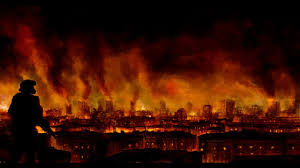After the Fall of Jerusalem
40:1 to 44:30
586 BC after the fall of Yerushalayim

Jerusalem fell, but not all the Jews were killed or sent into exile. Nebuchadnezzar followed a humane policy (40:7-43:7). He appointed a fellow Jew, Gedaliah, as governor and seemingly gave him sufficient authority to carry out his responsibilities. Gradually, Gedaliah was able to bring a measure of order to the ravished land. His loyal supporter and spokesman for all the army officers, Johanan, warned that Ishma’el was plotting against his life. But Gedaliah rejected the warning, which proved only too accurate. Ishma’el slaughtered most of a large band of pilgrims from Samaria making their way to mourn over the fallen City. Johanan overtook Ishma’el and released the prisoners, but Ishma’el escaped. Johanan and many others stopped at Geruth Kimham (a stopping place for caravans and their camels to stay overnight) near Bethlehem to decide their course of action. In the account of these crucial events, Jeremiah’s name is not mentioned.
The next section (43:8-44:30) deals with Yirmeyahu and his relationship with the remnant of Jews. When they sought his counsel, he advised them to return to their homes in Y’hudah. However, they fled with him and Baruch to Egypt where he predicted that Nebuchadnezzar would then attack Egypt. There was a lot of tension between Jeremiah and the remnant. He told them that they were suffering because of their idolatry, and that they would die in the coming Babylonian invasion. They answered that they had prospered while freely worshiping the Queen of Heaven, and when they stopped all their troubles began! Jeremiah’s last recorded words are a repetition of the warning.360



Leave A Comment